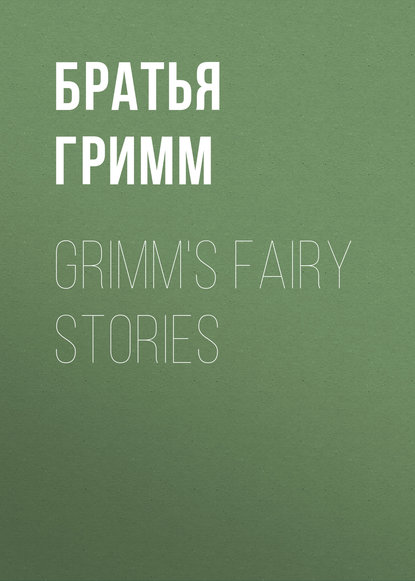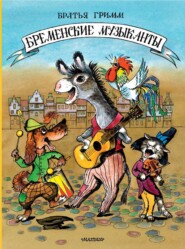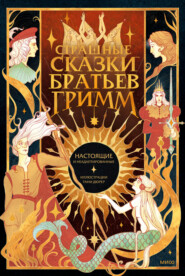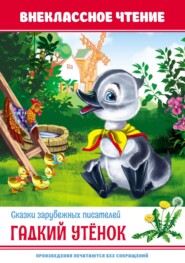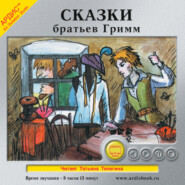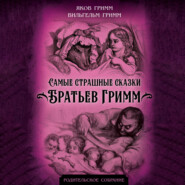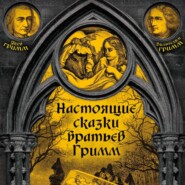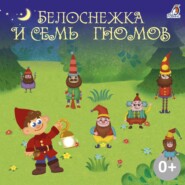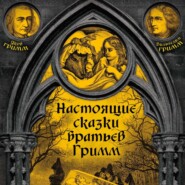По всем вопросам обращайтесь на: info@litportal.ru
(©) 2003-2024.
✖
Grimm's Fairy Stories
Настройки чтения
Размер шрифта
Высота строк
Поля
"A soldier and a coward!" replied the other, "that cannot be; you may put me to any proof."
"Well, then," replied the stranger, "look behind you."
The Soldier turned and saw a huge bear, which eyed him very ferociously. "Oho!" cried he, "I will tickle your nose for you, that you shall no longer be able to grumble"; and, raising his musket, he shot the bear in the forehead, so that he tumbled in a heap upon the ground, and did not stir afterward. Thereupon the stranger said, "I see quite well that you are not wanting in courage; but there is yet one condition which you must fulfil." "If it does not interfere with my future happiness," said the Soldier, who had remarked who it was that addressed him; "if it does not interfere with that, I shall not hesitate."
"That you must see about yourself!" said the stranger. "For the next seven years you must not wash yourself, nor comb your hair or beard, neither must you cut your nails nor say one paternoster. Then I will give you this coat and mantle, which you must wear during these seven years; and if you die within that time you are mine, but if you live you are rich, and free all your life long."
The Soldier reflected for awhile on his great necessities, and, remembering how often he had braved death, he at length consented, and ventured to accept the offer. Thereupon the Evil One pulled off the gray coat, handed it to the soldier, and said, "If you at any time search in the pockets of your coat when you have it on, you will always find your hand full of money." Then also he pulled off the skin of the bear, and said, "That shall be your cloak and your bed; you must sleep on it, and not dare to lie in any other bed, and on this account you shall be called 'Bearskin.'" Immediately the Evil One disappeared.
The Soldier now put on the coat, and dipped his hands into the pockets, to assure himself of the reality of the transaction. Then he hung the bearskin around himself, and went about the world chuckling at his good luck, and buying whatever suited his fancy which money could purchase. For the first year his appearance was not very remarkable, but in the second he began to look quite a monster. His hair covered almost all his face, his beard appeared like a piece of dirty cloth, his nails were claws, and his countenance was so covered with dirt that one might have grown cresses upon it if one had sown seed! Whoever looked at him ran away; but because he gave the poor in every place gold coin they prayed that he might not die during the seven years; and because he paid liberally everywhere, he found a night's lodging without difficulty. In the fourth year he came to an inn where the landlord would not take him in, and refused even to give him a place in his stables, lest the horses should be frightened and become restive. However, when Bearskin put his hand into his pocket and drew it out full of gold ducats the landlord yielded the point, and gave him a place in the outbuildings, but not till he had promised that he would not show himself, for fear the inn should gain a bad name.
While Bearskin sat by himself in the evening, wishing from his heart that the seven years were over, he heard in the corner a loud groan. Now the old Soldier had a compassionate heart, so he opened the door and saw an old man weeping violently and wringing his hands. Bearskin stepped nearer, but the old man jumped up and tried to escape; but when he recognized a human voice he let himself be persuaded, and by kind words and soothings on the part of the old Soldier he at length disclosed the cause of his distress. His property had dwindled away by degrees, and he and his daughters would have to starve, for he was so poor that he had not the money to pay the host, and would therefore be put into prison.
"If you have no care except that," replied Bearskin, "I have money enough"; and causing the landlord to be called, he paid him, and put a purse full of gold besides into the pocket of the old man. The latter, when he saw himself released from his troubles, knew not how to be sufficiently grateful, and said to the Soldier, "Come with me; my daughters are all wonders of beauty, so choose one of them for a wife. When they hear what you have done for me they will not refuse you. You appear certainly an uncommon man, but they will soon put you to rights."
This speech pleased Bearskin, and he went with the old man. As soon as the eldest daughter saw him, she was so terrified at his countenance that she shrieked out and ran away. The second one stopped and looked at him from head to foot; but at last she said, "How can I take a husband who has not a bit of a human countenance? The grizzly bear would have pleased me better who came to see us once, and gave himself out as a man, for he wore a hussar's hat, and had white gloves on besides."
But the youngest daughter said, "Dear father, this must be a good man who has assisted you out of your troubles; if you have promised him a bride for the service your word must be kept"
It was a pity the man's face was covered with dirt and hair, else one would have seen how glad at heart these words made him. Bearskin took a ring off his finger, broke it in two, and, giving the youngest daughter one half, he kept the other for himself. On her half he wrote his name, and on his own he wrote hers, and begged her to preserve it carefully. Thereupon he took leave, saying, "For three years longer I must wander about; if I come back again, then we will celebrate our wedding; but if I do not, you are free, for I shall be dead. But pray to God that he will preserve my life."
When he was gone the poor bride clothed herself in black, and whenever she thought of her bridegroom burst into tears. From her sisters she received nothing but scorn and mocking. "Pay great attention when he shakes your hand," said the eldest, "and you will see his beautiful claws!" "Take care!" said the second, "bears are fond of sweets, and if you please him he will eat you up, perhaps!" "You must mind and do his will," continued the eldest, "or he will begin growling!" And the second daughter said further, "But the wedding will certainly be merry, for bears dance well!" The bride kept silence, and would not be drawn from her purpose by all these taunts; and meanwhile Bearskin wandered about in the world, doing good where he could, and giving liberally to the poor, for which they prayed heartily for him. At length the last day of the seven years approached, and Bearskin went and sat down again on the heath beneath the circle of trees. In a very short time the wind whistled, and the Evil One presently stood before him and looked at him with a vexed face. He threw the Soldier his old coat and demanded his gray one back. "We have not got so far as that yet," replied Bearskin; "you must clean me first." Then the Evil One had, whether he liked it or no, to fetch water, wash the old Soldier, comb his hair out, and cut his nails. This done, he appeared again like a brave warrior, and indeed was much handsomer than before.
As soon as the Evil One had disappeared, Bearskin became quite light-hearted; and going into the nearest town he bought a fine velvet coat, and hired a carriage drawn by four white horses, in which he was driven to the house of his bride. Nobody knew him; the father took him for some celebrated general, and led him into the room where his daughters were. He was compelled to sit down between the two eldest, and they offered him wine, and heaped his plate with the choicest morsels; for they thought they had never seen any one so handsome before. But the bride sat opposite to him dressed in black, neither opening her eyes nor speaking a word. At length the Soldier asked the father if he would give him one of his daughters to wife, and immediately the two elder sisters arose, and ran to their chambers to dress themselves out in their most becoming clothes, for each thought she should be chosen. Meanwhile the stranger, as soon as he found himself alone with his bride, pulled out the half of the ring and threw it into a cup of wine, which he handed across the table. She took it, and as soon as she had drunk it and seen the half ring lying at the bottom her heart beat rapidly, and she produced the other half, which she wore round her neck on a riband. She held them together, and they joined each other exactly, and the stranger said, "I am your bridegroom, whom you first saw as Bearskin; but through God's mercy I have regained my human form, and am myself once more." With these words he embraced and kissed her; and at the same time the two eldest sisters entered in full costume. As soon as they saw that the very handsome man had fallen to the share of their youngest sister, and heard that he was the same as "Bearskin," they ran out of the house full of rage and jealousy.
CINDERELLA
The wife of a rich man fell sick: and when she felt that her end drew nigh, she called her only daughter to her bedside, and said, "Always be a good girl, and I will look down from heaven and watch over you." Soon afterwards she shut her eyes and died, and was buried in the garden; and the little girl went every day to her grave and wept, and was always good and kind to all about her. And the snow spread a beautiful white covering over the grave; but by the time the sun had melted it away again, her father had married another wife. This new wife had two daughters of her own: they were fair in face but foul at heart, and it was now a sorry time for the poor little girl. "What does the good-for-nothing thing want in the parlor?" said they; and they took away her fine clothes, and gave her an old frock to put on, and laughed at her and turned her into the kitchen.
Then she was forced to do hard work; to rise early, before daylight, to bring the water, to make the fire, to cook and to wash. She had no bed to lie down on, but was made to lie by the hearth among the ashes, and they called her Cinderella.
It happened once that her father was going to the fair, and asked his wife's daughters what he should bring to them. "Fine clothes," said the first. "Pearls and diamonds," said the second. "Now, child," said he to his own daughter, "what will you have?" "The first sprig, dear father, that rubs against your hat on your way home," said she. Then he bought for the two first the fine clothes and pearls and diamonds they had asked for: and on his way home, as he rode through a green copse, a sprig of hazel brushed against him, so he broke it off and when he got home he gave it to his daughter. Then she took it, and went to her mother's grave and planted it there, and cried so much that it was watered with her tears; and there it grew and became a fine tree, and soon a little bird came and built its nest upon the tree, and talked with her and watched over her, and brought her whatever she wished for.
Now it happened that the king of the land held a feast which was to last three days, and out of those who came to it his son was to choose a bride for himself; and Cinderella's two sisters were asked to come. So they called Cinderella, and said, "Now, comb our hair, brush our shoes, and tie our sashes for us, for we are going to dance at the king's feast." Then she did as she was told, but when all was done she could not help crying, for she thought to herself, she would have liked to go to the dance too, and at last she begged her mother very hard to let her go, "You! Cinderella?" said she; "you who have nothing to wear, no clothes at all, and who cannot even dance – you want to go to the ball?" And when she kept on begging, to get rid of her, she said at last, "I will throw this basinful of peas into the ash heap, and if you have picked them all out in two hours' time you shall go to the feast too." Then she threw the peas into the ashes; but the little maiden ran out at the back door into the garden, and cried out —
"Hither, thither, through the sky, turtle-doves and linnets, fly!
Blackbird, thrush, and chaffinch gay, hither, thither, haste away!
One and all, come, help me quick! haste ye, haste ye – pick, pick, pick!"
Then first came two white doves; and next two turtle-doves; and after them all the little birds under heaven came, and the little doves stooped their heads down and set to work, pick, pick, pick; and then the others began to pick, pick, pick, and picked out all the good grain and put it into a dish, and left the ashes. At the end of one hour the work was done, and all flew out again at the windows. Then she brought the dish to her mother. But the mother said, "No, no! indeed, you have no clothes and cannot dance; you shall not go." And when Cinderella begged very hard to go, she said, "If you can in one hour's time pick two of these dishes of pease out of the ashes, you shall go too." So she shook two dishes of peas into the ashes; but the little maiden went out into the garden at the back of the house, and called as before and all the birds came flying, and in half an hour's time all was done, and out they flew again. And then Cinderella took the dishes to her mother, rejoicing to think that she should now go to the ball. But her mother said, "It is all of no use, you cannot go; you have no clothes, and cannot dance; and you would only put us to shame;" and off she went with her two daughters to the feast.
Now when all were gone, and nobody left at home, Cinderella went sorrowfully and sat down under the hazel-tree, and cried out —
"Shake, shake, hazel-tree, gold and silver over me!"
Then her friend the bird flew out of the tree and brought a gold and silver dress for her, and slippers of spangled silk; and she put them on, and followed her sisters to the feast. But they did not know her, she looked so fine and beautiful in her rich clothes.
The king's son soon came up to her, and took her by the hand and danced with her and no one else; and he never left her hand, but when any one else came to ask her to dance, he said, "This lady is dancing with me." Thus they danced till a late hour of the night, and then she wanted to go home; and the king's son said, "I shall go and take care of you to your home," for he wanted to see where the beautiful maid lived. But she slipped away from him unawares, and ran off towards home, and the prince followed her; then she jumped up into the pigeon-house and shut the door. So he waited till her father came home, and told him that the unknown maiden who had been at the feast had hidden herself in the pigeon-house. But when they had broken open the door they found no one within; and as they came back into the house, Cinderella lay, as she always did, in her dirty frock by the ashes; for she had run as quickly as she could through the pigeon-house and on to the hazel-tree, and had there taken off her beautiful clothes, and laid them beneath the tree, that the bird might carry them away; and had seated herself amid the ashes again in her little old frock.
The next day, when the feast was again held, and her father, mother and sisters were gone, Cinderella went to the hazel-tree, and all happened as the evening before.
The king's son, who was waiting for her, took her by the hand and danced with her; and, when any one asked her to dance, he said as before, "This lady is dancing with me." When night came she wanted to go home; and the king's son went with her, but she sprang away from him all at once into the garden behind her father's house. In this garden stood a fine large pear-tree; and Cinderella jumped up into it without being seen. Then the king's son waited till her father came home, and said to him, "The unknown lady has slipped away, and I think she must have sprung into the pear-tree." The father ordered an axe to be brought, and they cut down the tree, but found no one upon it. And when they came back into the kitchen, there lay Cinderella in the ashes as usual; for she had slipped down on the other side of the tree, and carried her beautiful clothes back to the bird at the hazel-tree, and then put on her little old frock.
The third day, when her father and mother and sisters were gone, she went again into the garden, and said —
"Shake, shake, hazel-tree, gold and silver over me!"
Then her kind friend the bird brought a dress still finer than the former one, and slippers which were all of gold; and the king's son danced with her alone, and when any one else asked her to dance, he said, "This lady is my partner." Now when night came she wanted to go home; and the king's son would go with her, but she managed to slip away from him, though in such a hurry that she dropped her left golden slipper upon the stairs.
So the prince took the shoe, and went the next day to the king, his father, and said, "I will take for my wife the lady that this golden shoe fits."
Then both the sisters were overjoyed to hear this; for they had beautiful feet, and had no doubt that they could wear the golden slipper. The eldest went first into the room where the slipper was, and wanted to try it on, and the mother stood by. But her big toe could not go into it, and the shoe was altogether much too small for her. Then the mother said, "Never mind, cut it off. When you are queen you will not care about toes; you will not want to go on foot." So the silly girl cut her big toe off, and squeezed the shoe on, and went to the king's son. Then he took her for his bride, and rode away with her.
But on their way home they had to pass by the hazel-tree that Cinderella had planted, and there sat a little dove on the branch, singing —
"Back again! back again! look to the shoe!
The shoe is too small, and not made for you!
Prince! prince! look again for thy bride,
For she's not the true one that sits by thy side."
Then the prince looked at her foot, and saw by the blood that streamed from it what a trick she had played him. So he brought the false bride back to her home, and said, "This is not the right bride; let the other sister try and put on the slipper." Then she went into the room and got her foot into the shoe, all but the heel, which was too large. But her mother squeezed it in till the blood came, and took her to the king's son; and he rode away with her. But when they came to the hazel-tree, the little dove sat there still, and sang as before. Then the king's son looked down, and saw that the blood streamed from the shoe. So he brought her back again also. "This is not the true bride," said he to the father; "have you no other daughters?"
Then Cinderella came and she took her clumsy shoe off, and put on the golden slipper, and it fitted as if it had been made for her. And when he drew near and looked at her face the prince knew her, and said, "This is the right bride."
Then he took Cinderella on his horse and rode away. And when they came to the hazel-tree the white dove sang —
"Prince! prince! take home thy bride,
For she is the true one that sits by thy side!"
FAITHFUL JOHN
Once upon a time there lived an old King, who fell very sick, and thought he was lying upon his death-bed; so he said, "Let faithful John come to me." This faithful John was his affectionate servant, and was so called because he had been true to him all his lifetime. As soon as John came to the bedside, the King said, "My faithful John, I feel that my end approaches, and I have no other care than about my son, who is still so young that he cannot always guide himself aright. If you do not promise to instruct him in everything he ought to know, and to be his guardian, I cannot close my eyes in peace." Then John answered, "I will never leave him; I will always serve him truly, even if it costs me my life." So the old King was comforted, and said, "Now I can die in peace. After my death you must show him all the chambers, halls, and vaults in the castle, and all the treasures which are in them; but the last room in the long corridor you must not show him, for in it hangs the portrait of the daughter of the King of the Golden Palace; if he sees her picture, he will conceive a great love for her, and will fall down in a swoon, and on her account undergo great perils, therefore you must keep him away." The faithful John pressed his master's hand again in token of assent, and soon after the King laid his head upon the pillow and expired.
After the old King had been borne to his grave, the faithful John related to the young King all that his father had said upon his death-bed, and declared, "All this I will certainly fulfil; I will be as true to you as I was to him, if it costs me my life." When the time of mourning was passed, John said to the young King, "It is now time for you to see your inheritance; I will show you your paternal castle." So he led the King all over it, upstairs and downstairs, and showed him all the riches, and all the splendid chambers; only one room he did not open, containing the perilous portrait, which was so placed that one saw it directly the door was opened, and, moreover, it was so beautifully painted that one thought it breathed and moved; nothing in all the world could be more lifelike or more beautiful. The young King remarked, however, that the faithful John always passed by one door, so he asked, "Why do you not open that one?" "There is something in it," he replied, "which will frighten you."
But the King said, "I have seen all the rest of the castle, and I will know what is in there," and he went and tried to open the door by force. The faithful John pulled him back, and said, "I promised your father before he died that you should not see the contents of that room; it would bring great misfortunes both upon you and me."
"Oh, no," replied the young King, "if I do not go in it will be my certain ruin; I should have no peace night nor day until I had seen it with my own eyes. Now I will not stir from the place till you unlock the door."
Then the faithful John saw that it was of no use talking; so, with a heavy heart and many sighs, he picked the key out of the great bunch. When he had opened the door, he went in first, and thought he would cover up the picture, that the King should not see it; but it was of no use, for the King stepped upon tiptoes and looked over his shoulder; and as soon as he saw the portrait of the maiden, which was so beautiful and glittered with precious stones, he fell down on the ground insensible. The faithful John lifted him up and carried him to his bed, and thought with great concern, "Mercy on us! the misfortune has happened; what will come of it?" and he gave the young King wine until he came to himself. The first words he spoke were, "Who does that beautiful picture represent?" "That is the daughter of the King of the Golden Palace," was the reply.
"Then," said the King, "my love for her is so great that if all the leaves on the trees had tongues, they should not gainsay it; my life is set upon the search for her. You are my faithful John, you must accompany me."
The trusty servant deliberated for a long while how to set about this business, for it was very difficult to get into the presence of the King's daughter. At last he bethought himself of a way, and said to the King, "Everything which she has around her is of gold – chairs, tables, dishes, bowls, and all the household utensils. Among your treasures are five tons of gold; let one of the goldsmiths of your kingdom manufacture vessels and utensils of all kinds therefrom – all kinds of birds, and wild and wonderful beasts, such as will please her, then we will travel with these, and try our luck." Then the King summoned all his goldsmiths, who worked day and night until many very beautiful things were ready. When all had been placed on board a ship, the faithful John put on merchant's clothes, and the King likewise, so that they might travel quite unknown. Then they sailed over the wide sea, and sailed away until they came to the city where dwelt the daughter of the King of the Golden Palace.
The faithful John told the King to remain in the ship, and wait for him. "Perhaps," said he, "I shall bring the King's daughter with me; therefore take care that all is in order, and set out the golden vessels and adorn the whole ship." Thereupon John placed in a napkin some of the golden cups, stepped upon land, and went straight to the King's palace. When he came into the castle yard, a beautiful maid stood by the brook, who had two golden pails in her hand, drawing water; and when she had filled them and had turned round, she saw a strange man, and asked who he was. Then John answered, "I am a merchant"; and opening his napkin he showed her its contents. Then she exclaimed, "Oh, what beautiful golden things!" and, setting the pails down, she looked at the cups one after another, and said, "The King's daughter must see these; she is so pleased with anything made of gold that she will buy all these." And taking him by the hand, she led him in; for she was the lady's maid. When the King's daughter saw the golden cups, she was much pleased, and said, "They are so finely worked that I will purchase them all." But the faithful John replied, "I am only the servant of a rich merchant; what I have here is nothing in comparison to those which my master has in his ship, than which nothing more delicate or costly has ever been worked in gold." Then the King's daughter wished to have them all brought; but he said, "It would take many days, and so great is the quantity that your palace has not halls enough in it to place them around." Then her curiosity and desire were still more excited, and at last she said, "Take me to the ship; I will go myself and look at your master's treasure."
The faithful John conducted her to the ship with great joy, and the King, when he beheld her, saw that her beauty was still greater than the picture had represented, and thought nothing else but that his heart would jump out of his mouth. Presently she stepped on board, and the King conducted her below; but the faithful John remained on deck by the steersman, and told him to unmoor the ship and put on all the sail he could, that it might fly as a bird through the air. Meanwhile the King showed the Princess all the golden treasures – the dishes, cups, bowls, the birds, the wild and wonderful beasts. Many hours passed away while she looked at everything, and in her joy she did not remark that the ship sailed on and on. As soon as she had looked at the last, and thanked the merchant, she wished to depart. But when she came on deck, she perceived that they were upon the high sea, far from the shore, and were hastening on with all sail. "Ah," she exclaimed in affright, "I am betrayed; I am carried off and taken away in the power of a strange merchant. I would rather die!"





